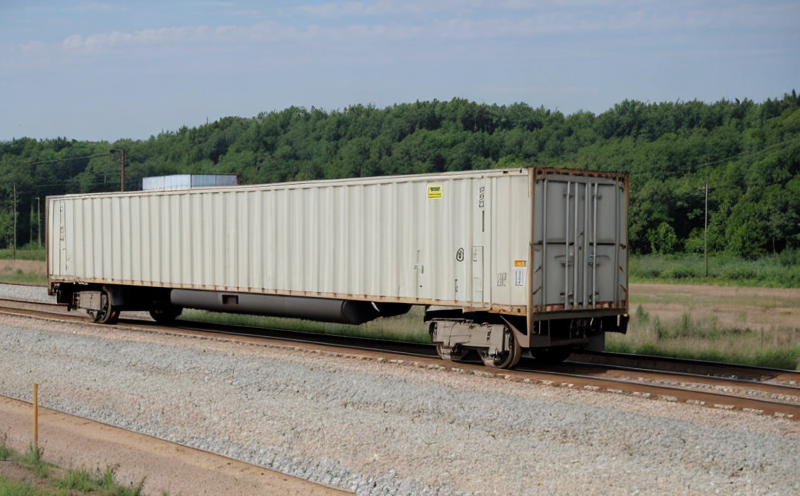EN 13262 Wheel Testing for Freight Wagons
The European Standard EN 13262 specifies the requirements and test methods for wheels intended to be used on freight wagons. This standard ensures that railway wheels meet stringent quality and safety criteria, which are crucial for maintaining the integrity of the transport infrastructure.
EN 13262 applies to all types of railway wheels designed for use with freight wagons operating at speeds up to 140 km/h. The standard covers various aspects including material composition, dimensions, and mechanical properties that ensure safe operation in a variety of environmental conditions. Compliance with this standard is mandatory for manufacturers aiming to sell wheels within the European Union.
The testing procedures outlined in EN 13262 are designed to identify potential defects or weaknesses that could compromise the wheel's performance during service. These tests encompass both non-destructive evaluation (NDE) techniques and destructive testing, providing comprehensive assessment of the wheel's structural soundness.
Non-destructive testing methods used include ultrasonic testing (UT), magnetic particle inspection (MPI), and radiographic examination (RT). These techniques allow for early detection of flaws such as cracks or inclusions without damaging the sample. Destructive testing involves more rigorous analysis where samples are subjected to simulated operating conditions, such as fatigue testing under load cycles, to evaluate their durability.
The standard also specifies detailed requirements regarding wheel geometry and surface finish, ensuring compatibility with other components of the wagon system. Proper wheel geometry is critical for smooth rolling contact with the rail, minimizing wear and tear on both the wheels and tracks while enhancing overall operational efficiency.
In addition to mechanical performance testing, EN 13262 emphasizes the importance of chemical composition analysis. This ensures that all raw materials used in manufacturing adhere strictly to specified limits, preventing any adverse effects from impurities or alloying elements on wheel behavior under extreme conditions.
Compliance with this standard not only enhances safety but also supports sustainable practices by promoting longevity and reliability of railway equipment. By adhering to these rigorous specifications, manufacturers can contribute towards reducing maintenance costs and enhancing public confidence in rail transport systems across Europe.
Why It Matters
The importance of EN 13262 cannot be overstated when it comes to ensuring the safety and reliability of railway transportation. Wheels are among the most critical components in any freight wagon, responsible for supporting load weight and transferring forces between the vehicle and tracks during movement.
Non-compliance with this standard can lead to catastrophic failures such as wheel fractures or derailments, posing significant risks not only to passengers but also to infrastructure integrity. Such incidents could result in severe accidents leading to loss of life, extensive property damage, and substantial economic losses due to service disruptions.
The implementation of stringent testing protocols according to EN 13262 helps prevent these hazards by identifying potential weaknesses early on during production processes. This proactive approach ensures that only high-quality wheels reach the market, thereby contributing significantly to enhanced passenger safety and reduced operational risks for railways worldwide.
Moreover, compliance with this standard fosters trust among stakeholders including customers, regulatory bodies, and investors who rely heavily upon reliable information regarding product quality and performance. It also supports international trade by harmonizing technical specifications across borders, making it easier for manufacturers to export their products globally without facing additional barriers.
Applied Standards
The European Standard EN 13262 is one of several key standards governing the design and testing of railway wheels. Other relevant international standards include ISO 4957, which specifies requirements for seamless steel rails used in railways; ASTM E829, providing guidelines for tensile testing of metallic materials; ASME Section VIII Division II, covering pressure vessel codes applicable to certain types of freight wagons.
EN 13262 specifically addresses the unique challenges associated with wheel design and manufacturing for use in freight wagon applications. It integrates elements from these broader standards into more specific requirements tailored explicitly toward this sector's needs. For instance, while ISO 4957 focuses on rail quality control, EN 13262 emphasizes wheel geometry and surface finish.
Compliance with EN 13262 ensures that wheels meet the highest levels of safety and performance standards required by modern freight transportation systems. By adhering strictly to this standard throughout production processes, manufacturers can demonstrate their commitment to producing safe, reliable products capable of withstanding harsh operating conditions typical in rail transport.
Moreover, compliance with EN 13262 facilitates smoother regulatory approvals and easier market access for exporters seeking to penetrate European markets. This is particularly important given the increasing global focus on harmonizing technical regulations across different countries within the EU.
Eurolab Advantages
At Eurolab, we offer comprehensive wheel testing services based on EN 13262 that cater specifically to the needs of freight wagon manufacturers operating in Europe. Our state-of-the-art facilities equipped with advanced instrumentation enable precise measurement and evaluation of various parameters critical for ensuring compliance with this standard.
Our team comprises highly skilled professionals experienced in interpreting results derived from both non-destructive and destructive testing methods described within EN 13262. They provide expert insights tailored to help clients understand their test outcomes better, enabling them to make informed decisions regarding product improvements or adjustments needed before finalizing designs.
We offer flexible scheduling options allowing customers to schedule tests at convenient times without disrupting production schedules. Additionally, we ensure prompt turnaround times for delivering reports containing detailed findings and recommendations based on our thorough evaluations conducted in accordance with EN 13262 requirements.
Our commitment to quality extends beyond mere compliance; it encompasses continuous improvement initiatives aimed at staying ahead of emerging trends and technological advancements within the railway industry. By leveraging cutting-edge technology coupled with deep domain knowledge, Eurolab remains committed to delivering superior services that meet evolving expectations set forth by stakeholders across various sectors.





